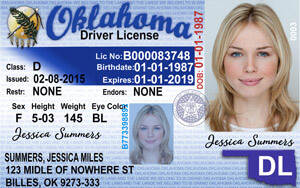- Updated for April 2025
- Based on official Oklahoma Driver's manual
Free Oklahoma SOK Permit Practice Test Two 2025
If you live in the Sooner State and don’t have a driving license and your heart desires to obtain one – here’s our gift to you. Check our 2nd OK permit practice test brought to the comfort of your home and available 24/7. It is designed to give you the idea of what you’ll be doing once you take a DMV Permit Test and therefore get better prepared to take and pass it. Like a real SOK exam, our test is based on the latest official Oklahoma Driver’s Manual and has the same structure and scoring system. Want to give it a go?
Here we go – the first question below has four answer options, just like the rest of the questions on this test. Click the best one – that’s it. Not sure which one is best? We’d suggest rereading the driver’s manual, but to save time, you can use our hints (remember that a real SOK exam doesn’t have them). Look at the progress bar on the left-hand side of the screen – if it flashes green, you’re free to continue – the next task will appear automatically. You’ll have to stop and sort it out if it’s red. Read the explanation of your mistake – it’ll help you avoid it on the next try. Yes, you can retake our OK permit practice test as many times as you need to enhance your traffic rules knowledge and test skills – in each new try, the tasks will be randomized for better practice.
If you still have the payment question, look at the beginning of the description – it’s a gift. If it’s free, one doesn’t have to pay money, do they? And you probably noticed there’s no registration. Do you like the sound of it? Then “Like” our test by hitting the button above or tweet your friends about it. Now start making it OK – good luck!
- Perfect for learner’s permit, driver’s license, and Senior Refresher Test
- Triple-checked for accuracy
What you need to know

What to expect on the actual OK SOK exam
questions
correct answers to pass
passing score
minimum age to apply
List of questions (classic view)
- You must NOT pass
- If it starts to rain on a hot day, use caution because the pavement may be slippery for the first few minutes. This is due to
- Because of their size, trucks and buses may move _________ to make a right turn.
- Which of the following are two types of speed signs?
- This sign warns the drivers to
- To enter a roundabout, you must _________ whether you need to make a right turn, a left turn, or a U-turn or continue forward.
- When passing a bicycle that is traveling in the same direction as you are, you must leave at least _______ of space between your vehicle and the bicycle.
- A pedestrian using a white cane or a white cane tipped with red is usually
- When passing a motorcycle, you must
- You must report a change of name or address to the Department of Public Safety within
- To make a right turn from a four-lane divided highway, enter the right lane well in advance of the turn and make
- You are on a two-lane road with traffic moving in both directions. To pass on the left, you must
- When entering or exiting a roundabout, you must
- When entering a main road from a private road, a driveway, or an unpaved road, you must
- A flashing yellow light means
- Mileposts are placed along the outside shoulder to mark the edge of the roadway. They give information to drivers about
- When stopped behind another vehicle on a hill, you should stay back at least
- If you see a yield sign in your lane, you must
- A flashing yellow light used mostly on tow trucks and slow-moving vehicles requires other vehicles to
- When approaching an intersection to make a right turn, you must stay _________ and make the turn close to the right curb.
- This service sign shows the location of
- This sign is
- When you see a triangular road sign, you must
- When driving on a one-way street with three or more lanes of traffic, you should use
- You may pass a vehicle on the right in all of the following situations EXCEPT
- When you are turning right on red, you must yield to
- If you double your speed on a highway, your braking distance increases by
- Where there are both a solid and a dashed yellow line between opposing lanes of traffic, you must NOT pass
- This sign indicates
- Do NOT sound your horn if
- _________ may be used in work zones in both day and night to guide drivers into certain traffic lanes.
- You are traveling on a two-lane road. If a vehicle ahead of you stops for a pedestrian, you must
- To avoid a head-on collision if there is an oncoming vehicle in your lane, you should
- You may pass another vehicle if there is _________ next to your lane.
- While you are driving, talking on a cell phone may increase your chances of being in a crash by
- On a divided highway, _________indicates the left edge of traffic lanes going in the same direction as you are.
- To turn around on a narrow, two-way street, you may make
- Work zone signs have
- What does this sign indicate to drivers?
- If you are driving in heavy rain, you must slow down to avoid
More resources
- Alabama: Test 1 / Test 2
- Alaska: Test 1 / Test 2
- Arizona: Test 1 / Test 2
- Arkansas: Test 1 / Test 2
- California: Test 1 / Test 2
- Colorado: Test 1 / Test 2
- Connecticut: Test 1 / Test 2
- Delaware: Test 1 / Test 2
- District of Columbia: Test 1 / Test 2
- Florida: Test 1 / Test 2
- Georgia: Test 1 / Test 2
- Hawaii: Test 1 / Test 2
- Idaho: Test 1 / Test 2
- Illinois: Test 1 / Test 2
- Indiana: Test 1 / Test 2
- Iowa: Test 1 / Test 2
- Kansas: Test 1 / Test 2
- Kentucky: Test 1 / Test 2
- Louisiana: Test 1 / Test 2
- Maine: Test 1 / Test 2
- Maryland: Test 1 / Test 2
- Massachusetts: Test 1 / Test 2
- Michigan: Test 1 / Test 2
- Minnesota: Test 1 / Test 2
- Mississippi: Test 1 / Test 2
- Missouri: Test 1 / Test 2
- Montana: Test 1 / Test 2
- Nebraska: Test 1 / Test 2
- Nevada: Test 1 / Test 2
- New Hampshire: Test 1 / Test 2
- New Jersey: Test 1 / Test 2
- New Mexico: Test 1 / Test 2
- New York: Test 1 / Test 2
- North Carolina: Test 1 / Test 2
- North Dakota: Test 1 / Test 2
- Ohio: Test 1 / Test 2
- Oklahoma: Test 1 / Test 2
- Oregon: Test 1 / Test 2
- Pennsylvania: Test 1 / Test 2
- Rhode Island: Test 1 / Test 2
- South Carolina: Test 1 / Test 2
- South Dakota: Test 1 / Test 2
- Tennessee: Test 1 / Test 2
- Texas: Test 1 / Test 2
- Utah: Test 1 / Test 2
- Vermont: Test 1 / Test 2
- Virginia: Test 1 / Test 2
- Washington: Test 1 / Test 2
- West Virginia: Test 1 / Test 2
- Wisconsin: Test 1 / Test 2
- Wyoming: Test 1 / Test 2
Your go-to, trusted source
Experience the Driving-Tests differenceOur commitment to accuracy and quality in our practice tests
Explore our rigorous, multi-tiered verification process that ensures each question mirrors the official manual for unparalleled accuracy.

At Driving-Tests.org, we understand the importance of reliable and accurate practice tests to help you prepare for your DMV exam. That's why we've developed a meticulous process to create and continually update our practice questions, ensuring they reflect the most current driving laws and regulations.
Here's an inside look at how we maintain the highest quality in our practice tests.
Content Creation and Verification Process
- Alignment with Official Manuals:
Every question we develop is based on the most recent version of each state's official driving manual. Our team regularly monitors each state DMV's website for the latest updates to ensure our practice tests are always aligned with the most current information. - Community Feedback Integration:
We leverage feedback from our vast community of users to understand which topics are most frequently tested. This helps us focus on the areas that are most relevant and beneficial for your preparation. - Expert Content Creation:
Our in-house editor, Steven, who has extensive experience in driver education, crafts each question with precision. He conducts a thorough review of each question against the official manuals to ensure accuracy. - Rigorous Review Process:
Once Steven has finalized a set of questions, our team conducts a joint review session. This second level of scrutiny involves content accuracy, proofreading, and fact-checking to eliminate any errors. - User Feedback Mechanism:
After a question goes live on our site, we keep the lines of communication open. Each question features a feedback button, inviting users to report any issues or errors. This continuous feedback loop allows us to address and rectify any concerns promptly. - Responsive Updates:
In line with our commitment to accuracy, we quickly update our practice questions to reflect any changes in the DMV manuals. Additionally, we update the free electronic copy of the state's driver's license manuals on our site, typically within a few days after the DMV publishes them.
Our thorough quality control process ensures that you have access to practice tests that are as accurate and up-to-date as possible. We believe in the power of well-prepared drivers and are dedicated to providing you with the best study tools to help you succeed on your DMV exam.
Before you view your test results, discover how you can pass faster with Premium:
- Real Exam-Like Oklahoma QuestionsGet 650+ questions seen on the real test
- Money-Back GuaranteeIf you don't pass, it costs you nothing
- 97% Premium Users Pass on Their First TryCompare with the average US passing rate of 49%





Trusted by 1.15 Million drivers
